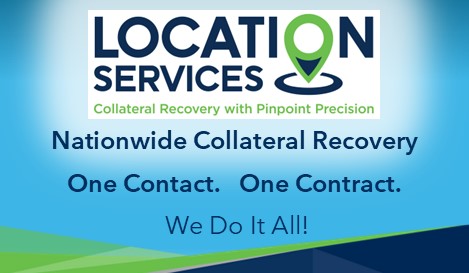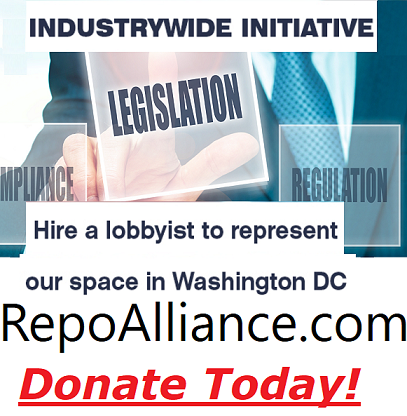
Dear recovery industry professionals,
The Collateral Recovery Industry was hit hard by both Federal and State Legislative actions. With this in mind, the American Recovery Association (ARA) initiated the formation of The Repo Alliance Legislative Action Fund (Repo Alliance).
Repo Alliance recognizes the division in our industry has prevented us from having a voice in legislative actions at the federal level and in most states. Repo Alliance further recognizes the initiative for our industry to have a voice in legislative actions must be ongoing.
Repo Alliance, comprised of The American Recovery Association (ARA), The California Association of Licensed Repossessors (CALR), Harding Brooks Insurance Company, and The Texas Accredited Repossession Professionals (TARP) raised the alarm. In the midst of moratorium shut downs, many of you dug deep and selflessly gave to support the hiring and supporting of Van Scoyoc Associates to represent our interests on “The Hill” in Washington D.C. The Repo Alliance and those who gave realize, “If you’re not at the table, you are on the menu”.
Please read the Repo Alliance Outreach and synopsis of legislative actions below for more details. The best election forecasters in the nation are showing that former Vice President Joe Biden has a better than 50/50 chance to win the Presidency. These forecasters also find a 50/50 chance that the Democrats will take back control of the US Senate. Just Imagine.
We must continue our educational outreach to legislators. We need your help.
We’ve gained some positive traction thus far. The future of our industry is at stake.
URGENT
The REPO ALLIANCE has not been able to raise the funds necessary to keep shouting from the roof tops on The Hill. Our industry needs to come together and understand this threat is as real as it gets. It will not go away by keeping quiet.
DIG DEEP. Send your donations to the Repo Alliance. Big or small, every dollar counts. Think of your families, your employees and their families. Think about your children’s futures. Your dreams about the good life and the dreams for your children’s futures could be stolen from you without a strong presence on The Hill.
REMEMBER, “IF YOU’RE NOT AT THE TABLE, YOU ARE ON THE MENU”.
We haven’t suffered through all the pains of small business ownership to be on anyone’s menu. DONATE TODAY, DONATE TOMORROW, AND KEEP DONATING UNTILL THE BATTLE IS WON.
Recent legislative actions:
- Phase 1:HR 6074, the Coronavirus Preparedness and Response Supplemental Appropriations Act.Passed by the House and Senate, and signed into law on March 6, 2020 as Public Law 116-123.The law generally provides emergency appropriations to federal health agencies to combat and treat COVID-19.
- Phase 2:HR 6201, the Families First Coronavirus Relief Act.Passed by the House and Senate, and signed into law on March 18, 2020 (public law number yet to be formalized).This law generally provides financial aid to individuals and families impacted by COVID-19.
- Phase 3:HR 748, the Coronavirus Aid, Relief, and Economic Security Act, or CARES Act. Passed by the House and Senate, and signed into law March 27, 2020 as Public Law 116-136.This legislation provided roughly $2.2 trillion in economic relief to various industries, families, and individuals.Yet to be introduced legislation intended to provide economic assistance to individuals, businesses, and industries impacted by the COVID-19 pandemic.
Important for our industry to know: Key provisions in that bill impose a moratorium on evictions and foreclosures related to certain dwellings. It was reported that House Democrats had also fought during the bipartisan negotiations for provisions which also impose a moratorium on repossessions and other forms of collateral recovery. Ultimately, that effort was not successful.
- Phase 3.5:HR 266, the Paycheck Protection Program and Healthcare Enhancements Act. Passed by the House and Senate, and signed into law April 24, 2020.This legislation provides $484 billion to replenish Phase 3 small business and health care programs which were running out of funds.
In May, Democrats in the House of Representatives passed their first Phase 4 offer, called the Health and Economic Recovery Omnibus Emergency Solutions Act, or HEROES Act (HR 6800). The HEROES Act was vast in scope and provided roughly $3.5 trillion in aid. Because the bill was written by Democrats with very little input from Republicans, many of the provisions which were not included in the CARES Act, were included in the HEROES Act.
Key provisions for the collateral recovery industry include:
Section 110203: This section bans for six-months the repossession of personal property, including motor vehicles and recreational vehicles “used as a dwellings,” in effect starting with the enactment of the HEROES Act. Due to poor drafting, it is unclear whether the intent of this section is to apply to all vehicles or only vehicles which are homes for individuals.
Section 110402: This section bans creditors and financial institutions (including auto finance companies) from collecting individual debt through the use of repossession. This ban lasts until 120 days after the expiration of the COVID-19 emergency declaration signed by the President, which itself lasts at the discretion of the President.
Section 110601: This section bans creditors and financial institutions (including auto finance companies) from collecting small business and nonprofit organization debt through the use of repossessions. This ban lasts until 120 days after the expiration of the COVID-19 emergency declaration signed by the President, which itself lasts at the discretion of the President.
This was intended to begin the bipartisan negotiations with the Senate and the White House but the Senate, weary of spending trillions on badly managed aid programs, argued that congress should “push pause” and see how everything worked out from Phase 3.
REPO ALLIANCE OUTREACH
After the House passage of the HEROES Act, Repo Alliance, through Van Scoyoc Associates, began educating key senators and representatives about the harm caused by the repossession moratorium. We have met with staff from the Senate Banking Committee, the House Financial Services Committee, and rank and file members. We described the impact it would have on the recovery industry, consumers, and lenders alike. During this period, Republicans in the Senate seemed very receptive to our arguments. They affirmed that when the Senate Republicans proposed a Phase 4 bill of their own, it would not include a repossession moratorium. They understood the broader implications it would have on the economy. Knowing the Senate bill would not include a moratorium, ARA’s request was that when the two sides begin negotiating, that Republican negotiators adhere to the Senate position. Ultimately, when the Senate, in fact, did introduce a Republican Phase 4 proposal, it did not include a repossession moratorium.
ARA and members of the Repo Alliance have taken advantage of the congressional impasse, and the less imminent threat it presents, to begin longer-term efforts to educate and begin a more positive dialogue with policy makers. Our advocacy plan has been to first shore up support in opposition to moratorium provisions and then embark on a longer and much-needed effort to re-cast the way in which the industry is viewed.
It is imperative (particularly if Democrats are in control of both bodies), that we work with them to recognize the harm caused by moratoriums, such that they consider alternative approaches when drafting provisions to provide constituent relief negotiations.
Repo Alliance decided to begin this next phase of outreach earlier than we had planned. We realized if the economy did not continue to rebound and, if true financial relief was not supplied, small businesses such as ours in the collateral recovery industry would continue to live under a heightened threat level. It’s a good thing we did.
Now phase 4 has come out from the Democrats and their proposal is not good for us. It contains the following language:
The formal text has been released. Here it is.
We have confirmed that the text is identical to the applicable sections on repossession that were included in the HEROES Act. The following sections from Division O:
Section 203 (Same as Section 110203 in the HEROES Act): This section bans for six-months the repossession of personal property, including motor vehicles and recreational vehicles “used as a dwellings,” in effect starting with the enactment of the HEROES Act. Due to poor drafting, it is unclear whether the intent of this section is to apply to all vehicles or only vehicles which are homes for individuals.
Section 402 (Same as Section 110402 of the HEROES Act): This section bans creditors and financial institutions (including auto finance companies) from collecting individual debt through the use of repossession. This ban lasts until 120 days after the expiration of the COVID-19 emergency declaration signed by the President, which itself lasts at the discretion of the President.
Section 601 (Same as Section 110601 of the HEROES Act): This section bans creditors and financial institutions (including auto finance companies) from collecting small business and nonprofit organization debt through the use of repossessions. This ban lasts until 120 days after the expiration of the COVID-19 emergency declaration signed by the President, which itself lasts at the discretion of the President. 402. Restrictions on collections of consumer debt during a national disaster or emergency.
Sec. 404. Credit facility.
• This section provides creditors access to a Federal Reserve facility to receive a low-interest, long-term loan where payments would be deferred until a borrower resumes making payments to the creditor pursuant to the debt collection moratorium and forbearance provided in this title.
As you can see, the Democrats are at it once again. Note the language in section 402, we would be shut down for the entire duration of the emergency declaration and for 120 days (4 months) after the declaration has been lifted. In other words, you could be shut down for an undeclared amount of time. If the CDC and some medical experts have their way, our industry could be shut down for 1 ½ years.












Facebook Comments